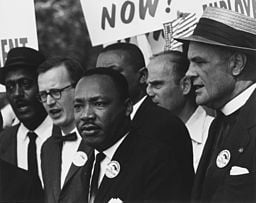
Today is Martin Luther King Junior Day.
Today is the day that bloggers are supposed to think of something inoffensive to say about Martin Luther King, Junior.
And, as a white woman, I don’t know exactly what to say.
I’m probably supposed to say something bland and cheerful about darkness not being able to drive out darkness, without giving the context of the quote. I’m likely expected to talk about “What Martin Luther King would have wanted” in this day and age. But this seems ludicrous to me. We all know very well what he wanted. He was clear and up front about what he wanted. He dreamed that one day this nation would rise up to live out the true meaning of its creed: “We hold these truths to be self-evident, that all men are created equal.” He knew full well that this nation never has lived that out. The man who penned those words in the Declaration of Independence kept slaves to work for him and satisfy his carnal urges; he fathered children on her, and those children became his slaves– some weren’t freed until after his death. Race-based chattel slavery wasn’t abolished in this country until 1863, and the Jim Crow laws King fought against so admirably were established almost immediately after.
King wanted all kinds of things, in order that we should live up to the true meaning of our creed. He didn’t stop at abolishing Jim Crow. He recognized that income inequality stood in the way of racial equality, and he was organizing a public demonstration against income inequality shortly before his death. He knew that war was opposed to his vision and oppressed the poor all over the world, so he spoke out against the war in Vietnam.
King was murdered for his activism. We like to make that sound so pretty, to say that he “gave his life for our country” or something of that sort. He knew full well that he would probably be murdered for his work and he kept doing it anyway, but this wasn’t a voluntary act. King was assassinated. He was shot to death for being a Black man who said the wrong things too loudly, for drawing attention to the plight of the wrong people. His wife went to bed that night without a husband, and his children never saw their father again– just as so many African-American women and children in our history had to do, when their fathers were taken from them by white men. We speak about his death as if it were a tidy, isolated event instead of one of thousands of murders of African Americans by angry white men. We don’t talk about it in light of lynchings. We try to make it sound tragic but beautiful. It wasn’t beautiful.
And many if not most of the people trying to parse what King would want today are the same kind of people who were relieved when he was shot.
Oh yes, many people were relieved when King was shot. They didn’t view him as a good person. They despised him as a troublemaker, the same way African American leaders who pester us too loudly for civil rights today are despised as troublemakers.
I grew up in a neighborhood that didn’t have any black people in it. This was because of redlining, but I didn’t know what redlining was. We didn’t learn about it in school. We learned about the Declaration of Independence and that the United States believed that all men are created equal, but we didn’t learn until much later that the people who wrote and signed that document kept slaves. We learned about slavery as a form of forced work with room and board provided but not a paycheck, which was bad enough; but little was said about the unspeakable torture and dehumanization inflicted on enslaved people. I didn’t learn what a lynching was until college. I thought Jim Crow was to do with being forced to sit at the back of a bus, nothing worse than that. It’s been quite a shock trying to educate myself about my own country’s history. And when I speak about what I know, people tell me I’m a racist against my own race, showing off and virtue signaling.
And just today I got a comment on one of my blog posts, by a man saying we should pray for African-Americans’ “unconditional conversion to the Catholic faith.” As if there weren’t plenty who were already Catholic. As if they were some kind of uncivilized monsters that we white people had to go and preach to, instead of human beings like us living in the same country. Maybe that wasn’t what he meant to imply, but I can’t think of any other explanation of his words.
The world hasn’t changed very much.
Martin Luther King was born in 1929. He would have been ninety this year. He’s not a part of the distant past. To understand what he would have wanted, we just have to look at what he said, because we live in the exact same world he did.
And what he said is more radical than many would like to admit. If he were saying it today, he would be viewed as dangerous, and if he were murdered today, many respectable people who don’t think of themselves as racists would be relieved. Just as they were fifty-one years ago.
The only thing I can think of to say about Martin Luther King, is that you should educate yourself about what he said, and apply it to the world we live in. Because it’s the same world.
(image via Wikimedia Commons)












